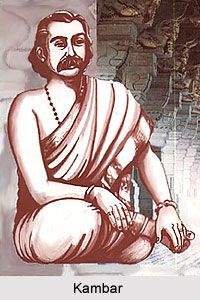 Kambar, also known as Kampan or Kamban, was a Tamil poet from the medieval era. He was born in the 12th century (c.1180) in Tiruvaluntur in Tanjore district. Kambar composed the Tamil Ramayanam, which is widely known as the Kambaramayanam, the Tamil version of the Ramayana composed in Sanskrit. He is the author of other Tamil literary works as well, namely Erezhupathu, Sarasvati Anthati, Kangai Puranam and Silaiezhupathu. Kambar was an eminent Tamil writer, scholar, poet, and playwright, most renowned for authoring Ramavatharam.
Kambar, also known as Kampan or Kamban, was a Tamil poet from the medieval era. He was born in the 12th century (c.1180) in Tiruvaluntur in Tanjore district. Kambar composed the Tamil Ramayanam, which is widely known as the Kambaramayanam, the Tamil version of the Ramayana composed in Sanskrit. He is the author of other Tamil literary works as well, namely Erezhupathu, Sarasvati Anthati, Kangai Puranam and Silaiezhupathu. Kambar was an eminent Tamil writer, scholar, poet, and playwright, most renowned for authoring Ramavatharam.
Early Life of Kambar
Kambar, the great Tamil poet belonged to the caste of Occhan or Ochchan. The Ochchan people were conventionally Nadaswaram players in the Tamil country and the rest of south India. Kambar was raised in the family of a rich farmer and in a proper household, in the region of in Vennai Nellur in southern India. The existing Chola king of the period heard many praises of the talented poet and called for Kambar in his royal court. The Chola king honoured the great Tamil poet with the distinguished title Kavi Chakravarthi, which means the Emperor of Poets.
Later Life of Kambar
Kambar or Kamban thrived and developed in a village named Therazhundur, located in the culturally rich district of Thanjavur, which is now situated in the present Tamil Nadu state in Southern India. Kambar was an excellent scholar of 2 ancient languages of the country, Tamil and Sanskrit. Prominent scholar Mahavidwan R. Raghava Iyengar provided adequate details about the 12th century poet in his Kavichakravarty Kamban. He was patronized and supported by his well wisher and Vallal Sadaiyappa Mudaliar. The renowned Tamil poet died in c.1250.
Literary Works of Kambar
Ramayana, the original Sanskrit version was composed by the Sage Valmiki. The Indian epic, containing 24,000 verses narrates the tale of Rama of Ayodhya, a Raghuvamsa prince. Sita, the wife of Prince Rama, is abducted by the demon Lord Ravana, a powerful emperor. According to traditions of Hinduism, Rama is considered as the Seventh incarnation of Lord Vishnu, one of the holy trinity in Hindu Mythology, along with Lord Brahma and Lord Shiva.
The Kamba Ramayanam, also known as Ramavataram, of Kambar is an epic of almost 11,000 verses, contrary to 24000 couplets of Valmiki. The Rama Avataram or Rama Kathai, as it was initially known, was accepted into the holy precincts in the attendance of Vaishnava Acharya Shriman Nathamuni. The Kamba Ramayanam is not just a mere translation of the Sanskrit version by sage Valmiki. Rather it is an original work which retells the tale of Lord Rama. The poetic work of Ramavataram is much admired for its similes. According to legends, Lord Ganesha composed the entire episode in a single night. It is widely believed that Lord Ganesha wrote the verses which were dictated by the Tamil poet Kambar during the night, as Kambar delayed the work of Kamba Ramayanam till the next day before the time limit set by the Chola King. There are 6 major parts in the Kamba Ramayanam and the four main parts among them are Bala Kaandam, Sundara Kaandam, Ayodhya Kaandam and Yudha Kaandam.
The work of Kamba Ramayanam comprises of more than 10,000 hymns and around 45,000 lines of pleasing poems and phrases, which makes the literary work as a greatest epic in Tamil literature.













